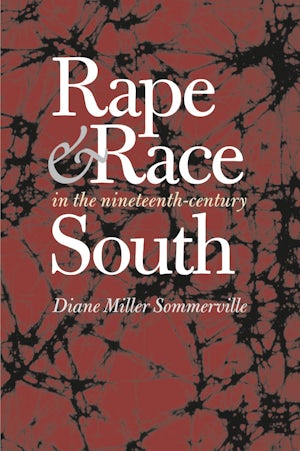Rape and Race in the Nineteenth-Century South
By Diane Miller Sommerville
432 pp., 6.125 x 9.25, 4 tables, appends., notes, bibl., index
-
Paperback ISBN: 978-0-8078-5560-7
Published: November 2004 -
E-book EPUB ISBN: 978-0-8078-7625-1
Published: October 2005 -
E-book PDF ISBN: 979-8-8908-7124-4
Published: October 2005
Buy this Book
- Paperback $42.50
- E-Book $29.99
For Professors:
Free E-Exam Copies
Awards & distinctions
2005 Phi Alpha Theta First Book Award, Phi Alpha Theta
A 2005 Choice Outstanding Academic Title
Sommerville demonstrates that despite draconian statutes, accused black rapists frequently avoided execution or castration, largely due to intervention by members of the white community. This leniency belies claims that antebellum white southerners were overcome with anxiety about black rape. In fact, Sommerville argues, there was great fluidity across racial and sexual lines as well as a greater tolerance among whites for intimacy between black males and white females. According to Sommerville, pervasive misogyny fused with class prejudices to shape white responses to accusations of black rape even during the Civil War and Reconstruction periods, a testament to the staying power of ideas about poor women's innate depravity.
Based predominantly on court records and supporting legal documentation, Sommerville's examination forces a reassessment of long-held assumptions about the South and race relations as she remaps the social and racial terrain on which southerners--black and white, rich and poor--related to one another over the long nineteenth century.
About the Author
Diane Miller Sommerville is associate professor of history at Binghamton University, State University of New York.
For more information about Diane Miller Sommerville, visit
the
Author
Page.
Reviews
"Extremely well researched and meticulously referenced. . . . A valuable addition to the field."--Archives of Sexual Behavior
"A provocative and important book."--Georgia Historical Quarterly
"Sommerville deconstructs a number of myths that both white southerners and historians have constructed. . . . This ambitious and interesting book will force historians to rethink the roots of the rape myth and the solidarity of white southerners."--H-SAWH
"Well-written and tightly argued. . . . Will be of strong interest to scholars of race, sexuality, and the social history of the law in the nineteenth-century South. . . . Offers valuable analysis and will be read with avid interest by historians of the American South."--Journal of the History of Sexuality
"This is an important monograph that makes a number of contributions to the way we understand southern history. . . . Sommerville's well-researched and well-written volume has made a lasting contribution to the way that we understand race and rape in the American South."--American Historical Review
"Sommerville [offers] lucid prose, extensive research, and clear-eyed tackling of a difficult subject."--Civil War History




